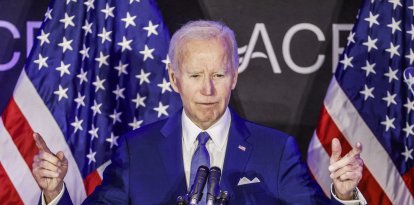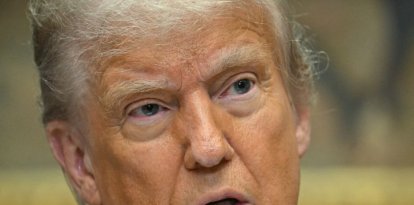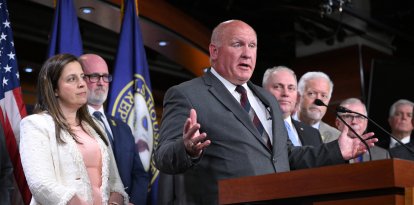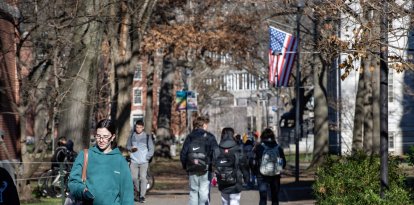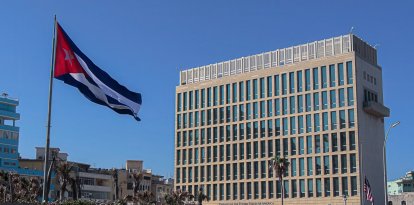Donald Trump sentenced to unconditional discharge in New York for the Stormy Daniels case
Judge Merchan sentenced the Republican after he was convicted of 34 counts by a grand jury in New York for the Stormy Daniels case led by Democratic District Attorney Alvin Bragg. This sentence leaves him without penalty despite his guilt.
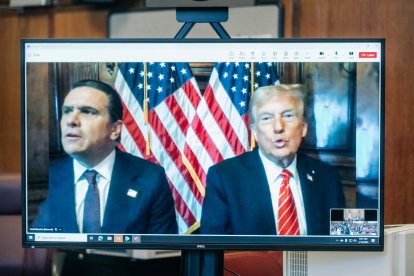
Donald Trump appears for his sentencing in New York telematically.
Donald Trump is now, officially,the first US president to be criminally convicted. This Friday, a Manhattan court sentenced Trump to unconditional discharge after he was found guilty in May last year for the Stormy Daniels case.
The unconditional discharge is an extraordinary and legal measure that Judge Merchan has resorted to in order to avoid any penalty of fine, probation or prison for Trump. This figure, however, maintains the convicted person's guilt.
Judge Juan Merchán assured that "the legal protections afforded to the office of the chief executive is a factor that prevails over all others." However, "they do not reduce the seriousness of the crime nor do they justify in any way its commission," the judge said in his ruling.
Trump, who appeared telematically by video call, again insisted on his innocence and denounced "a witch hunt" against him.
Consolation prize for Merchán and Bragg
Although they failed to derail the Republican's candidacy or prevent his electoral victory, Judge Juan Merchán and District Attorney Alvin Bragg got the consolation prize in the Stormy Daniels case by getting the sentence made public before the conservative mogul was sworn into office on Jan. 20.
The reading of the sentence came with suspense, after Trump's defense exhausted all possibilities of appeal before all competent courts until reaching the Supreme Court.
The "no" of five of the nine SCOTUS justices last Thursday, a day before the time set by Merchan to publish the ruling, closed the president-elect's hopes.

Politics
Supreme Court rejects Trump's attempt to block ruling in Stormy Daniels case
Sabrina Martin
Accusations of partisanship and corruption against Judge Merchan.
Among multiple and aggressive messages on Trump's social networks against the judge, whom he accused of creating -together with Bragg-, a nonexistent case against him to help the Democratic Party, and of being contaminated by the professional ties of his daughter with the blue formation, the team of the president-elect tried to convince Merchán himself on repeated occasions not to go ahead, something that the magistrate declined on each of them.
In fact, in his final brief, Merchán noted that he was rejecting the counsel's motion because "this Court has examined the defendant's arguments in support of its motion and finds that they are, for the most part,a repetition of arguments it has raised numerous times in the past."
A path of failed appeals to Pyrrhic victory for Merchan and Bragg.
The most that Trump's lawyers got was the postponement of the publication of the judgment until after the elections, which Merchán finally set for before the inauguration, avoiding the case dying upon the Republican's inauguration as president. With the date chosen, the magistrate guaranteed that Trump will be the first president convicted on criminal charges in history.
Immediately after that door closed, Trump's defense urgently appealed to the appeals court, but the judge Ellen Gesmer dismissed it and ordered the process to continue. The same fate befell the appeal to the Supreme Court in the Empire State, the last step before the Supreme Court also gave the green light to read the sentence.
A mess of skirts and 34 counts of falsifying business records.
Cohen himself denied this version before Congress, and the courtsbut he retracted and became one of Trump's biggest enemies afterreaching a collaboration agreementto get out of jail if he testified against the president-elect.
Alvin Braggtook the reins of the case, which most of the most prestigious jurists considered to be without merit and would be dismissed, and got State Judge Juan Merchan to accept it and begin the process.
Away heavily criticized by Trump, whom the judge was quick to impose a gag order that the president-elect has always considered to violate his constitutional right enshrined in the First Amendment. In addition, several experts noted that the way Merchán's case was handled iinfluenced notably the jury's final decision last May to find the then-conservative candidate guilty on all 34 counts,
RECOMMENDATION

